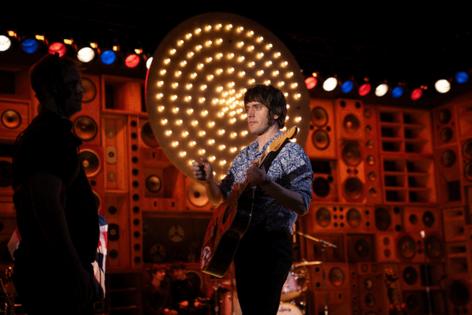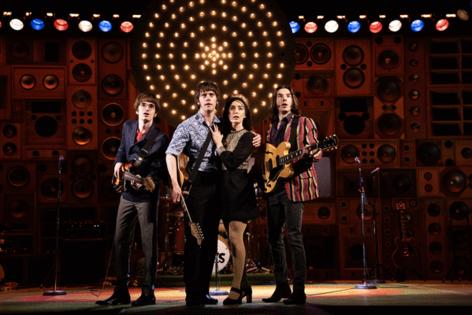Review: 'Sunny Afternoon' at Chicago Shakespeare chases the soul of Ray Davies and the Kinks
Published in Entertainment News
CHICAGO — The story and music of the Kinks belong on Broadway. No question. We’ve had “Jersey Boys,” “The Who’s Tommy,” Beatlemanias, the Doors and “Stereophonic.” Ray Davies’ band was a poetic paradox and thus far more interesting theatrically than all of ’em.
Where to start? We have a British invasion pop band that refused to entertain teenagers with the pablum of the same four chords. A rare socialist musician whose U.S. career was stalled by his refusal to deal with, of all things, unions. A nostalgist who craved change. A crew of violent radicals who missed their mums. An anti-establishment foursome whose elegiac music spoke of longing for lost British innocence, as really existing only in Davies’ own, now justly revered, head.
But what a diversely poetic catalog of songs. Seriously, “Waterloo Sunset,” “Lola,” “You Really Got Me,” “This Time Tomorrow.” On and on. Only that of the Beatles competes, and people know that body of work far more intimately than a catalog that’s been lost in the sands of times, probably more than the creators of “Sunny Afternoon” realize. At one point in this authorized Kinks musical from London, now in its North American premiere at Chicago Shakespeare Theater, I started musing on the mind-blowing difficulty faced by the show’s book writer, the British playwright Joe Penhall, who has to compete with the narrative poetry of Ray Davies’ own lyrics and gorgeously iconoclastic stories and vistas.
Like most new musicals, especially ambitious U.S. imports from London (no tariffs, please), “Sunny Afternoon” has a ways to go in finding out what it wants to be. It hasn’t decided what scale works. Broadway? Or are we talking something akin to “Lazarus,” the David Bowie tuner that honored the man by staying too weird for the Main Stem? More importantly, “Sunny Afternoon” has yet to determine whether to tell the standard-issue jukebox story of “misunderstood artist fighting the suits who want to take his money, put him in a box, make him commercial,” yada, yada, or strive for something more risky and radical.
There is ample justification for the former in the Kinks’ story. Davies sure did fight publishers and promoters. Hard. But audiences have been taught no record company executive or manager or publisher is ever sympathetic in these artist-driven shows, with the possible exception of Berry Gordy, although even then not in “Dreamgirls.” So that’s a predictable melodramatic trajectory into which “Sunny Afternoon” partly falls, and from which it should immediately clamber out. It should decide instead to stuff the easy road and embrace what made the Kinks the Kinks, and risk everything instead.
The far more interesting story and, frankly, the one Penhall is far better at writing and Edward Hall far better at directing, is the one inside and outside the Davies brothers’ heads: their relationship with their parents, their feelings over the grievous loss of their sister, their interactions within the rest of the band, the intermural conflicts, the pleasures, the clashes and flashes of genius, the unspooling melodies surprising even their creators, the Shakespearean switches between high tragedy and low comedy. Of life and art.
When “Sunny Afternoon” goes there, and, believe me, it often does, the show feels fresh, vibrant, joyful, unpredictable and delightfully chaotic — in other words, far truer to the Kinks’ story. Put in terms of the obvious Broadway influences here, the show needs to be more like “Stereophonic” and less like “Jersey Boys.”
The core of that more interesting route is already there from the London original (“Sunny Afternoon” was first seen more than a decade ago) and it’s at least partly a matter of updating and adding to it while excising the rest. Already, designer Miriam Buether has built an expressionistic backdrop of amplifiers. There’s one helpful cue.
I’d start with what’s now Scene 2 in Davies’ familial living room, not the messy opener with Davies and his goofy managers. Act 2 falls into the same opening trap with a cartoonish scene as the lads hit the U.S. That got laughs in London, no doubt, but here it feels cheap and obvious. Better to emphasize veracity, family and music, especially since Danny Horn, the young British actor playing Ray Davies, is a superbly cast knockout: he has the plaintive, pleading, insouciant voice, the lyricism, the brooding discontent and a palpable star quality.
For whatever else anyone could lob at this show, the piece has the Kinks’ signature sound down cold, running hot and loud. As it should.
Much attention clearly and laudably was paid to its precise replication, born of both a determination to stand out from the pack and a jerry-rigged amplifier. Kinks superfans will see and appreciate what I am talking about.
Oliver Hoare, who plays Ray’s bandmate brother Dave, also has imbued the Bros. Davies’ gestalt and knows how to tickle the fans, as Dave surely did. That pair of imported actors joins the very credible American additions Michael Lepore (who plays the late, famously handsome, bassist Peter Quaife) and Kieran McCabe (who plays, also in the musical sense, drummer Mick Avory). They work here alongside a busy ensemble that includes Emma Grace Bailey, Joy Campbell, John Carlin, Jared D.M. Grant, Will Leonard, Ben Mayne, Sean Fortunato, Joseph Papke and Marya Grandy.
Ana Margaret Marcu plays Ray Davies’ first wife, Rasa, a role that feels underwritten, especially since Marcu has a voice that harmonizes beautifully with Horn’s instrument. (The real person sang uncredited backing vocals on Kinks recordings.) We need more of that and less of Rasa being stuck home with the baby. We know all about the toll extracted by the road. It’s in dozens of shows.
This is the coda-less story of the early Kinks, and so no divorces, etc. Chrissie Hynde, with whom Davies had a daughter, does not make an appearance. I heard someone on the way out saying they wondered what happened to the band, which does beg a question, although that might be a rabbit hole given the complexity of the answer. Better I think to stick with the foundational truth of this great product of the fervent British years of pop and rock and the music, especially the latter.
We could stand a yet deeper dive into the catalog. Act 2 has at least one false ending. And at one point, a couch gets rolled out even while McCabe is doing a drum solo, which is nuts. Forget prepping the next scene. After all this work, the songs should be allowed to live and breathe. And when the actual Kinks creative process finally shows up, all too briefly in Act 2, it’s fascinating but feels rather tacked on.
Actually, that and the content of two of the most singular Muswell Hill skulls should be the core of the show. It’s why we all are there and key to the bright U.S. future of a very British “Sunny Afternoon.”
———
'SUNNY AFTERNOON'
3.5 stars
When: Through April 27
Where: The Yard at Chicago Shakespeare Theater on Navy Pier, 800 E. Grand Ave.
Running time: 2:30
Tickets: $64-$140 at 312-595-5600 and chicagoshakes.com
———
©2025 Chicago Tribune. Visit at chicagotribune.com. Distributed by Tribune Content Agency, LLC.
















Comments